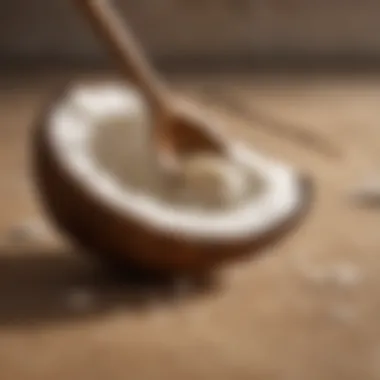Effective Natural Remedies for Dandruff Removal and Prevention


Well-Being Overview
Dandruff may seem like a minor issue, but it can have a significant impact on one's well-being. It is essential to address this common scalp condition not just for aesthetic reasons but also for overall health. Individuals experiencing dandruff often face self-esteem issues and discomfort, affecting their mental and physical well-being. By exploring natural ways to combat dandruff, we aim to provide holistic solutions that promote scalp health and boost confidence.
Physical Wellness
When it comes to tackling dandruff, focusing on physical wellness plays a crucial role. Regular exercise not only enhances blood circulation but also helps in maintaining a healthy scalp. Incorporating simple scalp massages into your routine can aid in reducing dandruff flakes and improving hair health. Additionally, staying hydrated and consuming nutrient-rich foods can nurture your scalp from within, contributing to dandruff reduction. Prioritizing physical wellness goes hand in hand with scalp care, offering a comprehensive approach to combating dandruff.
Mindfulness & Self-Care Practices
Practicing mindfulness can have a positive impact on dandruff management. Stress is known to exacerbate dandruff symptoms, making stress-reducing techniques like mindfulness meditation beneficial. Taking time for self-care rituals, such as relaxing baths or aromatherapy sessions, can help soothe both the mind and scalp. Finding a balance between work demands and relaxation is key in effectively managing dandruff. By incorporating mindfulness and self-care practices into your routine, you can enhance scalp health and overall well-being.
Nutrition for Nourishment
Consuming a well-balanced diet rich in essential nutrients can significantly impact dandruff reduction. Foods high in omega-3 fatty acids, zinc, and B vitamins promote a healthy scalp and hair growth. Including nutrient-dense foods like leafy greens, nuts, seeds, and fish in your diet can nourish your scalp from the inside out. Trying out easy and healthy recipes that incorporate these dandruff-fighting nutrients can be a delicious way to support scalp health. By focusing on nutrition for nourishment, you can address dandruff concerns while indulging in delectable and wholesome meals.
Understanding Dandruff
Dandruff is a common scalp condition that affects many individuals worldwide. In this article, the focus on understanding dandruff is crucial to provide a comprehensive guide on combating this issue effectively. By delving into the causes, symptoms, and impacts of dandruff on scalp health, readers can gain valuable insights into how to tackle this persistent problem naturally. Understanding the root causes of dandruff is key to formulating effective treatment and prevention strategies, making it an indispensable topic within the realm of scalp care and maintenance. By exploring the intricate details of dandruff, individuals can make informed decisions to promote a healthy scalp ecosystem.
Causes of Dandruff
Malassezia Yeast
One of the primary contributors to dandruff is the presence of Malassezia yeast on the scalp. This particular type of yeast feeds on the scalp's natural oils, disrupting the pH balance and leading to flaking and irritation. Understanding the role of Malassezia yeast in dandruff formation is essential for devising targeted treatments that address the underlying fungal overgrowth. While Malassezia yeast is a common inhabitant of the scalp, its proliferation can result in excessive shedding of skin cells, manifesting as dandruff. Recognizing the distinctive characteristics of Malassezia yeast allows individuals to choose appropriate remedies to restore scalp health. Despite its association with dandruff, some studies suggest that Malassezia yeast may also play a beneficial role in maintaining skin barrier function. Unveiling the intricate relationship between Malassezia yeast and dandruff provides valuable insights into holistic scalp care methods.
Dry Scalp
Characterized by a lack of moisture and hydration, dry scalp is another leading cause of dandruff. When the scalp's natural oils are insufficient to keep the skin moisturized, it can trigger itchiness and flaking, contributing to dandruff formation. Addressing the unique needs of a dry scalp is essential for restoring balance and preventing recurring dandruff issues. The key characteristic of dry scalp lies in its tendency to shed skin cells at a faster rate, leading to visible flakes on the scalp and clothing. While dry scalp can be exacerbated by external factors such as harsh shampoos or environmental conditions, proper hydration and nourishment can help alleviate symptoms and promote scalp health. Understanding the nuances of dry scalp allows individuals to tailor their dandruff removal approach to suit their specific skin requirements. Despite its challenges, a dry scalp can be effectively managed through a combination of targeted treatments and lifestyle adjustments.
Seborrheic Dermatitis
Seborrheic dermatitis is a chronic skin condition that affects the scalp, causing redness, flaking, and itching. The presence of yeast on the skin, combined with sebum production, can exacerbate seborrheic dermatitis, leading to stubborn dandruff. Addressing the underlying inflammation and sebum regulation is crucial for managing seborrheic dermatitis and reducing dandruff symptoms. The key characteristic of seborrheic dermatitis lies in its cyclical nature, with periods of flare-ups followed by remission. While the exact cause of seborrheic dermatitis remains unclear, factors such as genetics, stress, and immune system dysregulation may contribute to its development. By examining the unique features of seborrheic dermatitis, individuals can identify effective ways to alleviate symptoms and promote scalp wellness. Despite its chronic nature, seborrheic dermatitis can be managed through targeted treatments and lifestyle modifications, offering relief from persistent dandruff.
Symptoms of Dandruff


Flaky Scalp
The presence of white or yellow flakes on the scalp is a hallmark symptom of dandruff, indicating an imbalance in skin cell turnover. Flaky scalp can result from various factors, including dry skin, sebum overproduction, or fungal infections. Understanding the mechanism behind flaky scalp is essential for selecting appropriate remedies to address dandruff effectively. The key characteristic of flaky scalp lies in its visible manifestation through loose skin flakes that fall off the scalp, often landing on clothing and shoulders. While flaky scalp can be frustrating to manage, regular exfoliation and proper hydration can help alleviate symptoms and restore scalp health. By acknowledging the nuances of flaky scalp, individuals can implement targeted interventions to combat dandruff and promote a balanced scalp environment. Despite its persistent nature, flaky scalp can be controlled through consistent care and tailored treatments, offering relief from dandruff-related concerns.
Itching
The sensation of itchiness on the scalp is a common symptom of dandruff, often accompanied by redness and irritation. Scalp itching can result from the inflammatory response triggered by dandruff flakes and fungal overgrowth. Understanding the link between itching and dandruff is crucial for developing soothing remedies that provide relief and promote scalp health. The key characteristic of itching lies in its persistent nature, causing discomfort and distress to affected individuals. While scalp itching can be exacerbated by scratching or high-stress levels, incorporating calming ingredients and anti-inflammatory agents can help alleviate symptoms and restore scalp balance. By addressing the underlying cause of itching, individuals can take proactive steps to manage dandruff and prevent its recurrence effectively. Despite its disruptive effects, scalp itching can be managed through gentle care and targeted treatments, offering respite from dandruff-related itching episodes.
Oily Scalp
The presence of excessive oil on the scalp can contribute to dandruff formation, leading to greasy hair and skin irritation. An oily scalp is often a result of sebum overproduction, which can create an ideal environment for Malassezia yeast to thrive. Recognizing the symptoms of an oily scalp is essential for implementing tailored solutions that address dandruff at its core. The key characteristic of an oily scalp lies in its shiny appearance and tendency to attract dirt and impurities, posing a challenge for individuals seeking scalp clarity. While an oily scalp can be daunting to manage, incorporating clarifying ingredients and scalp-balancing techniques can help regulate sebum production and promote a healthy scalp environment. By understanding the implications of an oily scalp on dandruff formation, individuals can adopt targeted strategies to rebalance their scalp ecosystem, mitigating dandruff-related concerns. Despite its persistent nature, an oily scalp can be effectively controlled through diligent care and informed choices, offering a pathway to scalp rejuvenation and vitality.
Impact of Dandruff on Scalp Health
Inflammation
The inflammatory response triggered by dandruff can impact scalp health by causing redness, tenderness, and swelling on the skin. Inflammation is the body's natural defense mechanism against irritants, but chronic inflammation can disrupt the scalp's barrier function and lead to increased dandruff severity. Understanding the role of inflammation in dandruff formation is essential for devising anti-inflammatory strategies that soothe the skin and promote healing. The key characteristic of inflammation lies in its association with heat, pain, and redness, signaling an immune response to skin irritation. While inflammation can be exacerbated by environmental factors or stress, incorporating calming ingredients and cool compresses can help alleviate symptoms and restore scalp comfort. By addressing the impact of inflammation on scalp health, individuals can take proactive measures to reduce dandruff severity and foster a balanced scalp environment. Despite its disruptive effects, scalp inflammation can be managed through targeted treatments and lifestyle adjustments, offering relief from dandruff-related discomfort.
Hair Loss
The presence of dandruff can exacerbate hair loss by weakening the hair follicles and causing breakage or shedding. Hair loss can result from various factors, including inflammation, fungal infections, or excessive scratching of the scalp. Understanding the relationship between dandruff and hair loss is crucial for implementing hair-strengthening remedies that promote growth and scalp health. The key characteristic of hair loss lies in its gradual onset and thinning appearance, often accompanied by scalp sensitivity and brittleness. While hair loss can be distressing, incorporating nourishing oils and scalp massages can help stimulate circulation and promote hair regrowth. By addressing the impact of dandruff on hair health, individuals can adopt preventative measures to safeguard against further loss and maintain a voluminous mane. Despite its challenging nature, hair loss associated with dandruff can be managed through holistic treatments and scalp-nourishing rituals, offering a pathway to hair restoration and revitalization.
Scalp Irritation
The presence of dandruff can cause scalp irritation, leading to redness, sensitivity, and discomfort on the skin. Scalp irritation can result from various factors, including dryness, fungal overgrowth, or allergic reactions to hair products. Understanding the mechanisms of scalp irritation is essential for implementing soothing remedies that alleviate symptoms and restore scalp balance. The key characteristic of scalp irritation lies in its tendency to cause stinging or itching sensations, prompting individuals to seek relief and comfort. While scalp irritation can be exacerbated by external irritants or unsuitable hair care products, incorporating gentle formulations and scalp-soothing ingredients can help calm the skin and promote healing. By addressing the impact of scalp irritation on dandruff management, individuals can combat discomfort effectively and nurture a calm scalp environment. Despite its distressing effects, scalp irritation can be managed through targeted interventions and scalp-friendly practices, offering respite from dandruff-related irritations and fostering skin rejuvenation.
Natural Remedies for Dandruff Removal
When it comes to dandruff, natural remedies can offer a gentle yet effective way to tackle this common scalp issue. In this article, we delve deep into the realm of natural solutions for dandruff removal, offering insights that cater to individuals seeking holistic approaches to scalp care. Natural remedies not only target the symptoms of dandruff but also aim to address the root causes, providing a comprehensive approach to scalp health.
Essential Oils
Essential oils are potent extracts derived from various plants, each carrying unique properties that can benefit the scalp. Within this section, we explore three key essential oils renowned for their dandruff-fighting abilities: Tea Tree Oil, Lavender Oil, and Peppermint Oil.
Tea Tree Oil


Tea Tree Oil stands out as a potent antifungal and antibacterial agent, making it a popular choice for combating dandruff. Its key characteristic lies in its ability to soothe itching and reduce inflammation on the scalp, offering relief to those dealing with dandruff issues. While Tea Tree Oil possesses numerous advantages in dandruff treatment, it is crucial to be mindful of its potential drying effect on the scalp, requiring proper dilution for optimal results.
Lavender Oil
Famed for its calming aroma and gentle nature, Lavender Oil plays a dual role in dandruff removal by promoting scalp relaxation and moisturization. Its key characteristic lies in its soothing properties, which can help alleviate scalp irritation often associated with dandruff. The unique feature of Lavender Oil is its ability to not only target dandruff but also provide a sensory experience that aids in stress reduction, enhancing its overall benefits in this article.
Peppermint Oil
Renowned for its refreshing sensation and invigorating aroma, Peppermint Oil brings a cooling effect to the scalp, which can help alleviate itching and promote scalp health. Key characteristics of Peppermint Oil include its ability to stimulate blood circulation in the scalp, promoting overall scalp health and potentially aiding in dandruff prevention. While Peppermint Oil offers a range of benefits, its intense nature requires careful consideration of proper dilution to prevent skin sensitivities.
Home Ingredients
In addition to essential oils, home ingredients play a vital role in natural dandruff remedies, offering accessible and effective solutions for scalp care. Within this category, we explore the benefits of Apple Cider Vinegar, Aloe Vera, and Coconut Oil.
Lifestyle Changes for Dandruff Prevention
Understanding the importance of Lifestyle Changes for Dandruff Prevention is crucial in addressing the root causes of dandruff. By making strategic adjustments to one's daily routine and habits, individuals can significantly reduce the likelihood of dandruff recurrence. Lifestyle changes encompass various elements, including dietary modifications, stress management techniques, and proper hair care practices. These changes not only target dandruff directly but also promote overall scalp health, contributing to long-term relief. Emphasizing the role of Lifestyle Changes for Dandruff Prevention in this article sheds light on the holistic approach necessary to combat dandruff effectively.
Dietary Adjustments
Hydration
Hydration plays a pivotal role in dandruff prevention by maintaining the scalp's natural moisture balance. Adequate water intake helps nourish the scalp, preventing dryness and flakiness. The hydrating properties of water contribute to overall scalp health, reducing the risk of dandruff development. Embracing hydration as a cornerstone of dandruff management offers a simple yet impactful way to support scalp vitality. Despite its simplicity, hydration's effectiveness in combating dandruff makes it a popular choice among individuals seeking natural remedies for scalp conditions.
Omega- Fatty Acids
Omega-3 fatty acids are essential nutrients known for their anti-inflammatory properties and benefits to skin health. Including omega-3 fatty acids in one's diet can help alleviate scalp inflammation, a common precursor to dandruff. By incorporating sources of omega-3 fatty acids such as fish, flaxseeds, and walnuts into daily meals, individuals can promote a healthier scalp environment. The unique feature of omega-3 fatty acids lies in their ability to nourish the scalp from within, fostering hair growth and reducing dandruff-related symptoms. Despite some potential disadvantages, the advantages of omega-3 fatty acids in dandruff management make them a valuable addition to this article.
Probiotics
Probiotics offer a holistic approach to dandruff prevention by enhancing gut health, which in turn influences skin conditions like dandruff. The key characteristic of probiotics lies in their ability to balance the microbiome, promoting beneficial bacteria that aid in nutrient absorption and immune function. By consuming probiotic-rich foods such as yogurt, kimchi, and sauerkraut, individuals can support their body's natural defenses against dandruff-causing agents. The unique feature of probiotics is their systemic action, targeting dandruff at its roots by bolstering overall immunity. While there may be some considerations, the advantages of probiotics in dandruff prevention make them a worthwhile inclusion in this article.
Stress Management
Meditation


Meditation serves as a powerful tool in stress management, a key aspect of dandruff prevention. Its ability to calm the mind and reduce cortisol levels can have a profound impact on scalp health. The key characteristic of meditation is its capacity to promote relaxation and mental clarity, diminishing stress-induced triggers for dandruff. Engaging in regular meditation practices can significantly lower stress levels, improving overall scalp condition. The unique feature of meditation is its accessibility and versatility, making it a suitable option for individuals seeking natural ways to alleviate dandruff. Despite potential disadvantages, the advantages of meditation in stress management and dandruff prevention position it as a valuable component of this article.
Yoga
Yoga offers a holistic approach to stress reduction and overall well-being, both of which are essential in preventing dandruff. The key characteristic of yoga lies in its harmonizing effects on the body and mind, fostering a balanced internal environment. By practicing yoga regularly, individuals can enhance circulation, reduce tension, and promote relaxation—factors that directly impact scalp health. The unique feature of yoga is its adaptability to different skill levels and physical capabilities, making it a versatile option for individuals seeking dandruff relief. Despite potential drawbacks, the benefits of yoga in stress management and dandruff prevention make it a valuable asset in this article.
Breathing Exercises
Breathing exercises play a vital role in stress management and dandruff prevention by enhancing oxygen flow and promoting relaxation. The key characteristic of breathing exercises is their immediate impact on stress levels, helping individuals find mental clarity and calmness. By incorporating deep breathing techniques into daily routines, individuals can alleviate tension and reduce the likelihood of stress-related dandruff flare-ups. The unique feature of breathing exercises is their simplicity and accessibility, offering quick stress relief in various settings. Despite minor drawbacks, the advantages of breathing exercises in stress reduction and dandruff prevention highlight their significance in this article.
Hair Care Tips
Regular Washing
Regular washing of the hair is essential for maintaining scalp hygiene and preventing dandruff buildup. The key characteristic of regular washing is its ability to remove excess oil, dirt, and product residue from the scalp, promoting a clean and healthy environment. By using a gentle, dandruff-fighting shampoo and washing the hair regularly, individuals can reduce the accumulation of skin cells that contribute to flaking. The unique feature of regular washing is its simplicity and effectiveness in controlling dandruff symptoms, making it a practical choice for scalp care. Despite potential disadvantages such as overwashing, the advantages of regular washing in dandruff prevention validate its inclusion in this article.
Avoiding Harsh Chemicals
Avoiding harsh chemicals in hair care products is crucial for individuals prone to dandruff, as certain ingredients can exacerbate scalp sensitivity. The key characteristic of avoiding harsh chemicals is its ability to maintain the scalp's natural balance and prevent irritation. By opting for mild, natural hair care products free of sulfates and parabens, individuals can protect their scalp from potential triggers for dandruff. The unique feature of avoiding harsh chemicals is its gentle yet effective approach to scalp maintenance, promoting long-term dandruff relief. Despite some limitations, the advantages of avoiding harsh chemicals in dandruff prevention make it a significant aspect of this article.
Scalp Massage
Scalp massage is a therapeutic practice that can improve circulation, reduce tension, and stimulate hair follicles, all of which contribute to scalp health and dandruff prevention. The key characteristic of scalp massage is its ability to enhance blood flow to the scalp, delivering essential nutrients and oxygen to the hair follicles. By incorporating scalp massage into a regular hair care routine, individuals can promote relaxation, reduce stress, and improve overall scalp condition. The unique feature of scalp massage is its relaxing and rejuvenating effects, providing a holistic approach to dandruff management. Despite minor considerations, the advantages of scalp massage in promoting scalp health and dandruff prevention highlight its relevance in this article.
Professional Treatments for Severe Dandruff Cases
Professional treatments for severe dandruff cases play a crucial role in addressing persistent scalp concerns that natural remedies may not fully resolve. In cases where dandruff has become a persistent issue despite home care efforts, consulting a dermatologist for professional interventions becomes imperative. These treatments offer targeted solutions to combat dandruff at a more intense level, tailored to individual needs and scalp conditions. By delving into the realm of professional treatments, individuals can access specialized care to tackle severe dandruff issues effectively.
Consulting a Dermatologist
When seeking professional help for severe dandruff cases, dermatologists offer invaluable expertise and specialized treatment options. Prescription shampoos form a fundamental aspect of dermatologist-recommended interventions for dandruff treatment. These shampoos contain specific active ingredients designed to target dandruff at the root cause, providing relief from flaking and itching. Individuals benefit from the concentrated formulations of prescription shampoos, which help restore scalp health and balance sebum production. Despite their efficacy, prescription shampoos may have potential disadvantages, such as skin sensitivity or scalp dryness, which should be discussed with the dermatologist.
Prescription Shampoos
Prescription shampoos are formulated with potent ingredients like ketoconazole, selenium sulfide, or coal tar, known for their anti-fungal and anti-inflammatory properties. These components actively combat dandruff-causing factors, promoting a healthier scalp environment. The targeted nature of prescription shampoos allows for more effective treatment of stubborn dandruff, making them a popular choice for dermatological interventions. However, individuals using prescription shampoos should be aware of their potential side effects, including scalp irritation or changes in hair texture, requiring careful monitoring and dermatologist oversight.
Topical Treatments
In cases where dandruff persists despite conventional treatments, dermatologists may recommend topical treatments to address underlying scalp issues. Topical solutions containing corticosteroids or calcineurin inhibitors can help reduce inflammation and itching associated with severe dandruff. These treatments target dandruff-causing factors from a different perspective, complementing the action of prescription shampoos for comprehensive scalp care. Although effective, topical treatments may have limitations such as skin thinning or delayed healing, necessitating close supervision by dermatological experts.
Light Therapy
Light therapy, also known as phototherapy, has emerged as a promising treatment option for chronic dandruff conditions. By utilizing specific wavelengths of light to target fungi or inflammation on the scalp, light therapy offers a non-invasive approach to managing severe dandruff. This treatment modality can promote scalp healing, reduce flaking, and enhance overall scalp health. Despite its benefits, light therapy may not be suitable for all individuals and could necessitate multiple sessions for optimal results, highlighting the need for personalized dermatological guidance.



